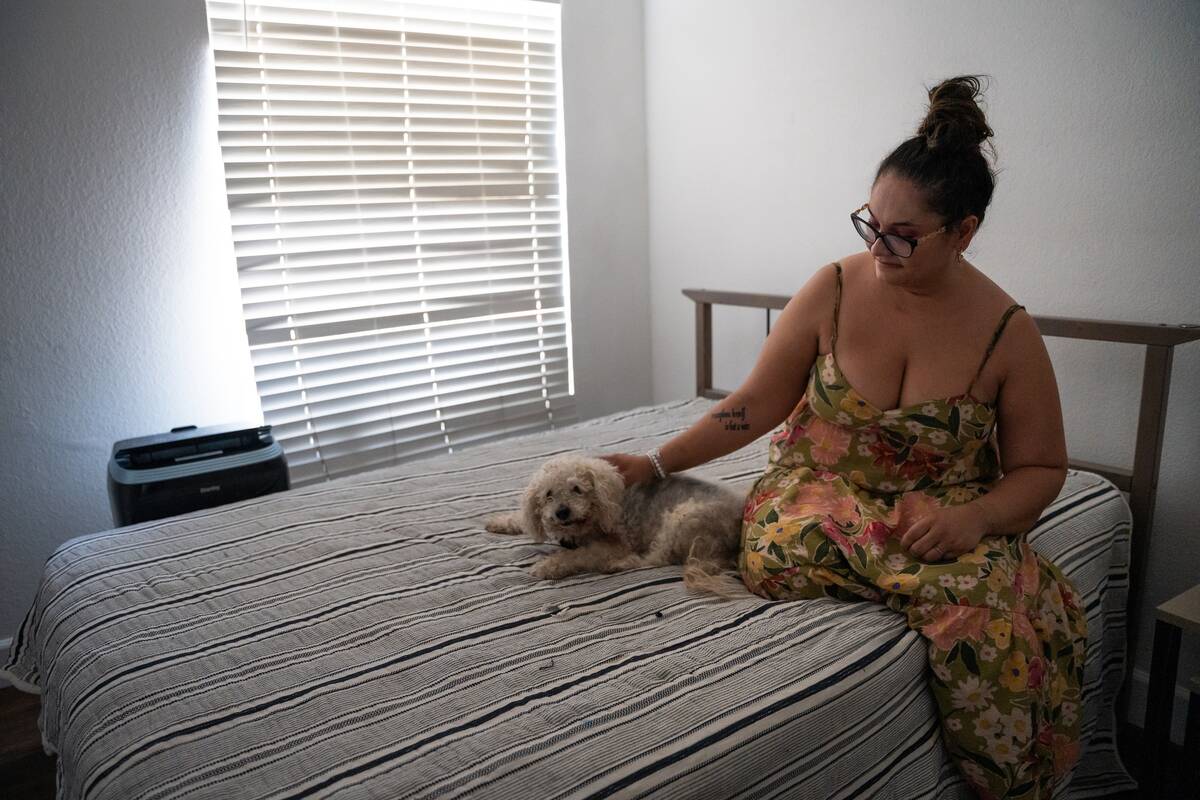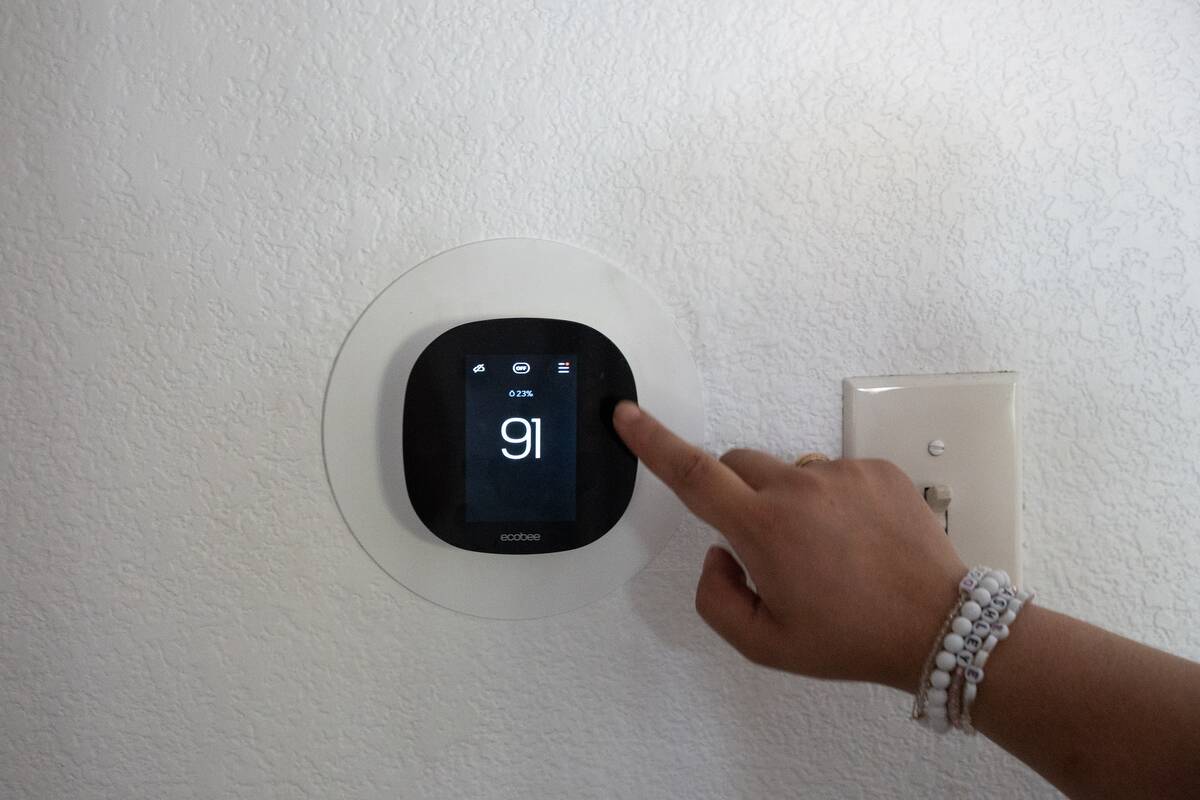What rights do Nevada tenants have when the AC goes out?
One of the worst things a homeowner can experience in Nevada’s searing summer heat is the air conditioning going out. But what are your rights as a renter when the AC goes out?
Ashley Webster, 36, who rents a unit at the Latigo complex on Silverado Ranch Boulevard, said her AC has been out since June 7. A thermostat in her hallway read 91 degrees on the morning of July 15. Later that afternoon, her thermostat rose to 96.
“I can’t eat here. If I eat, I throw up because I’m so hot, and it’s been so hot for so long,” Webster said. “I’m not sleeping. I’m getting up every hour to put a wet cloth on my dog. And that’s concerning to me. It’s like, she’s 11. Is this taking years off of her life because of the excessive heat?”
Nevada laws protect the rights of tenants to have working “essential services” such as running water, gas, electricity and, yes, AC. But there are limitations, so acting fast is key.
When essential services go out, landlords have 48 hours from being notified to fix the issue or make a best-effort attempt to, according to local experts. If adequate attempts aren’t made in that time, tenants can take a few different avenues, including withholding rent, moving to a comparable unit or suing for damages.
Webster said she initially reached out to her California-based landlord LBS Vegas Group the day her AC went out. She was told the group wouldn’t respond to maintenance requests over the weekend, she said, and they sent an AC technician two days later on a Monday evening.
The technician, who lives in a unit near Webster’s at the Latigo, said the AC machine needed a new compressor, Webster said. He installed it eight days later, before claiming that the problem was actually an electrical issue, she added. A separate contractor later told Webster the original technician was working on the wrong unit entirely, she said.
LBS Vegas Group, also known as LBS Properties, did not respond to a request for comment.
Webster’s sole solace is a portable air conditioning unit, borrowed from her grandfather, that’s now installed in her bedroom. But she said her landlord attempted to take credit for the AC unit over email.
“This AC window unit belongs to my grandfather,” she said. “My landlord and the AC technician made no attempt to provide that for me.”
In trying to find a solution, Webster said she visited local fire stations, contacted building code enforcement departments for Las Vegas and Clark County and even called 911. She said many of these groups told her nothing could be done because she didn’t own the property and lived in unincorporated Clark County.
Well over a month after the problems started, Webster said she is at a loss for what to do next.
What to do
So what rights do Nevada tenants like Webster have when their air conditioning breaks?
Taylor Altman is a staff attorney at the Legal Aid Center of Southern Nevada, a nonprofit law firm assisting people without the money to pay for legal services. She said the first thing tenants should do in this situation is send a “habitability letter” to their landlords notifying them of outages of essential services.
“We recommend doing it by certified mail, and then the tenant should keep a copy for their own records,” Altman said. “And so that puts the landlord on notice that they have 48 hours to fix that essential service.”
The habitability letter doesn’t actually need to be printed out and mailed, Altman said. It just needs to be in writing, so an email or text message can also work, she said.
Template habitability letters are available online through the Civil Law Self-Help Center, operated by the Legal Aid Center of Southern Nevada.
Property owners have 48 hours after receiving a habitability letter to restore the essential service or “use his or her best efforts to remedy the breach,” according to Nevada law. This excludes weekends and legal holidays.
If owners don’t fix the problem or make a best-effort attempt, there’s a few different avenues tenants can go down, Altman said.
“The most common things or common remedies that the tenant can take is withholding rent until the problem is fixed,” she explained. “The tenant can also move out temporarily to a comparable rental unit. Another thing they can do is sue the landlord for damages.”
Exercise caution
Ben Iness, a coalition manager at the Nevada Housing Justice Alliance, an advocacy group focused on tenants’ rights and housing issues, said people pursuing any legal remedies should be careful, as they often need to follow “very specific” processes.
If tenants want to withhold rent, they still need to make the same payments into a court “escrow account,” he said. These accounts are set up by justice courts for situations where rent can legally be withheld, such as if a unit isn’t in habitable condition. Tenants can’t just hold the money themselves.
“There may be an eviction hearing, and a tenant is like, ‘Hey, my AC has been broken for weeks. I withheld my rent,’” Iness explained. “But they’ll still get evicted because they unfortunately didn’t follow that specific process.”
Another solution some tenants can take is staying in a hotel and billing their landlord, Iness said, but there’s limitations there as well.
“Say you had to rent a hotel and motel for three days,” he explained. “That hotel and motel, those three days, shouldn’t exceed what three days worth of your total rent would be.”
Tenants with landlords who willfully interrupted their essential services have five days to file a complaint for expedited relief with a justice court, once again excluding weekends and legal holidays, Altman said. The court can order the property owner to restore services or even pay damages as a result.
In cases where an essential service has been down for a long time, Altman said she was unsure as to whether tenants could still seek expedited relief, as the five-day window had long passed. It’s a “strict deadline,” she added.
But if the date of the original violation in any case is unknown, there could be an argument that the property owners’ mismanagement was still ongoing, she said. These types of situations are approached differently depending on the situation.
“It’s probably best to come in and see us, and we can take it on a case-by-case basis,” Altman said. “And maybe it’s a continuing violation or a continuing unlawful act by the landlord, meaning they’re still within the five days.
The Legal Aid Center of Southern Nevada takes walk-ins at 725 E Charleston Blvd in Las Vegas on Mondays through Thursdays from 9 a.m. to 4 p.m., according to its website.
Contact Finnegan Belleau at fbelleau@reviewjournal.com.




















